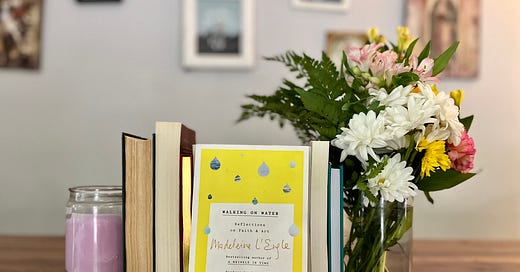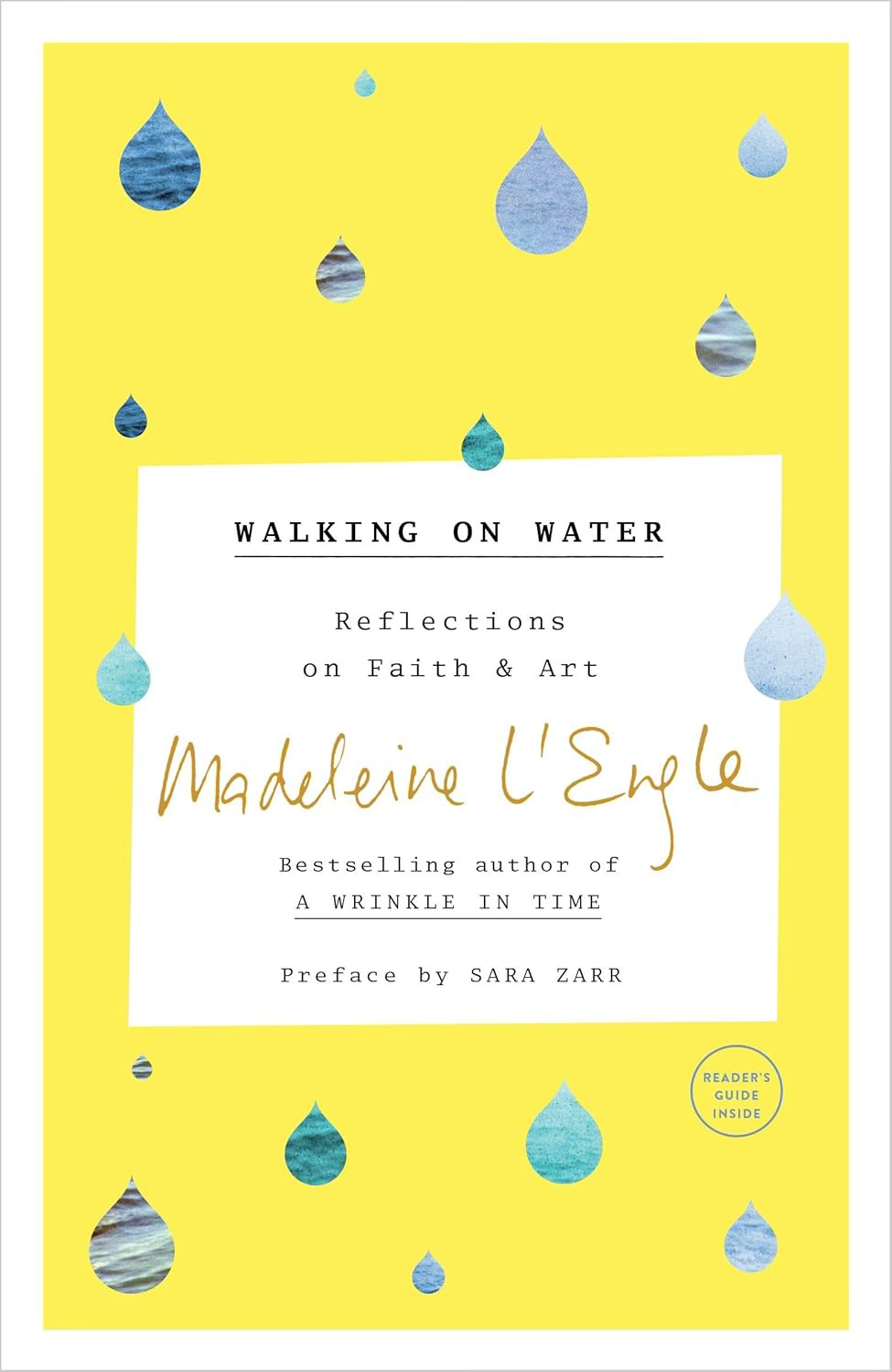Walking on Water and Short Stories Introduction
In which we send you off on your next reading adventure
Welcome to Reading Revisited, a place for friends to enjoy some good old-fashioned book chat while revisiting the truth, beauty, and goodness we’ve found in our favorite books.
Hello Readers,
We have made it to the new reading year and to our September book already! How did summer fly by so fast? I think I have this thought each year and yet I will say it again with every ounce of surprise as the first. How is summer over? But, with the end of summer also comes a new year of exciting books to read, so without further ado I give you an introduction to our September Book (and some short stories).
Every September we read a book about books. I always hope that reading one book about reading and/or writing will prime us to be able to read all of our other books even better than we would have otherwise.
This year we will be reading Madeleine L’Engle’s Walking on Water: Reflections on Faith and Art. It is a beautiful little book and I am very excited to meditate on how our faith affects our reading and how our reading affects our faith. Madeleine definitely has her theological quirks, but I encourage you to appreciate her where she is and enjoy her musings on the creative process.
Remembering the lovely things we have forgotten is one of the reasons for all art.
If you have ever read any of L’Engle’s fiction then I will warn you that this has a very different tone. However, if you have read any of her Crosswicks Journals (which are also lovely) then I think this will feel very familiar. L’Engle has a beautiful way of talking about how her art (writing) affects her faith and vice versa..It speaks to me, even as someone who has never had any fiction writing plans. The way she talks about stories has informed how I read and how it affects my relationship with God. I hope Madeleine adds some beauty to your literary life this September.
I have often been asked if my Christianity affects my stories, and surely it is the other way around; my stories affect my Christianity, restore me, shake me by the scruff of the neck, and pull this straying sinner into an awed faith.
You will notice that my copy of this book looks a little worse for the wear. That is because the last time I read it I was very largely pregnant with my fourth and in that last few grumpy weeks before her arrival. I was carting Walking on Water around with me in my bag because she has a way of adding beauty into the mundane. I had also thrown a coffee into my bag and knew it wouldn’t spill if it was sitting up perfectly, but my husband grabbed my bag and put it on its side and coffee spilled everywhere. I was not in a good place for book destruction (no matter how accidental) to be taken gracefully so the poor man felt way more guilty than he needed have. But now I would like to go back in time and thank him because he has given me an unexpected gift. When I went to look for quotes in my book I discovered that all of my notes and underlines have disappeared. If you’ve ever desecrated a book by underlining in pen (the horror I now feel at having once done this) apparently all you have to do to erase it is dip it in some coffee*. So now I will get to pretend that I am reading it for the first time all over again!
*I do not actually recommend this method as the pages of your book will never be the same again!
It was through story that I was able to make some small sense of the confusions and complications of life.
I couldn’t find any real life friends that have read this so I found this excerpt from Sarah Clarkson’s book about books,Book Girl (which I also highly recommend) about Walking on Water…
(L’Engle’s) fascinating comparison of the creative Christian to Mary, the mother of Jesus, as he or she is asked to become a bearer of the work of the Holy Spirit, has encouraged and strengthened me in the vocation of writer as well as that of homemaker, friend and wife…
Along with Walking on Water we are also going to read three (very) short stories, picked out by our own short story enthusiast Sarah Van Hecke. Sarah is a fellow book club member and has some of the keenest insights on books. You may remember her from one of our first podcast episodes on Crossing to Safety (if you haven’t listened to that, go ahead and do so now…Sarah’s thoughts may change the way you think about that book!). Sarah regularly makes me rethink a whole book after hearing her perspective. She also pushes me to read literary works besides the novel (which is obviously my favorite), which I am thankful for. I am so glad to have her on here writing (and we should definitely collectively peer pressure her to come back)! Here’s what she has to say about the stories…
Selecting a short story to read alongside Madeline L’Engle's Walking on Water: Reflections on Faith and Art was a challenge for two reasons. Firstly, having not yet read Walking On Water, I could not make as informed a choice as I might have hoped. Secondly, choosing one short story to share always breaks my brain and my heart a little bit, as I have so very many that I love so very dearly. The first difficulty was clumsily surmounted with several dubiously academic but nonetheless rigorous googling sessions concerning L'Engle's biography and personal beliefs, and the second challenge was overcome in its entirety by good old fashion cheating. Namely, Kelsie has generously allowed me to recommend three (very short!) short stories to share with you this month.
Each short story is by a different writer, though each deals explicitly with the Catholic faith that formed the religious backdrop of these authors' lives. Like L'Engle in her most famous work A Wrinkle in Time, Graham Greene’s The Hint of An Explanation, Caryll Houselander’s The Father, and Frank O'Connor’s First Confession each tackle the questions: "How can a loving God allow suffering and sin to exist in the world?" "How does the intersection of the spiritual world and the physical world affect me as a person? and "In the end, is the forgiveness and love of God and/or of our loved ones enough to overcome the darkness in the world and in our own souls?"
Readers already familiar with Graham Greene from The End of the Affair(March 2022) or The Power and the Glory (July 2021) likely remember Greene for his ability to vividly portray the soul as a battleground rife with all the grittiness of a physical war. In his short story The Hint of An Explanation, this battleground is the tender soul of a young boy undergoing the gravest temptation he has yet encountered as he is bribed and threatened into stealing a consecrated host. The frame story features the boy as an adult, conversing with an agnostic stranger on a train in the wake of World War II. Our protagonist pours out his memory as a personal offering to the stranger in defense of God - the hint of an explanation - as to how and why a good God might allow the suffering and temptation of an innocent child. The reader is left to decide if this hint is a strong enough defense of God, and whether similar “hints” might have been experienced in his or her own life. The striking imagery and characterization throughout are heavily based on the contrast between light and darkness, and cannot help but call to mind L'Engle's "Black Thing."
Caryll Houselander is probably best known for her nonfiction contemplative works such as her Marian reflection The Reed of God, but her fiction also shines with piercing and profound insights into the workings of the human heart. In The Father we see her juxtapose three very different experiences of fatherhood: that of a proud father struggling to forgive his wayward daughter, that of the parish priest come to counsel reconciliation, and that of God Himself who is the very pinnacle of fatherhood. This story provides an interesting opportunity to contrast L’Engle’s tendency toward belief in universal salvation (the belief that God will redeem all people, regardless of their beliefs or their sins) with the more traditional view that God honors the free will of men to choose even their own damnation. L’Engle asks, and I dare say Houselander answers, “How can we hold God up as the highest example of fatherhood if He does not save all of his children, despite being able to do so?”
A mere six pages long, First Confession by Frank O’Connor is a delightful example of how a skillful writer can bring several characters to life with shockingly few words. Narrated by seven-year-old Jackie, the story is hysterically funny in its portrayal of Jackie’s struggles with his porter drinking Gran, his seemingly pious older sister Nora, and his desire to make a good confession despite fearing that he couldn’t possibly be forgiven his attempt to stab his sister with a butter knife. Laced with Irish humor, this glimpse into the mind of a child rings true, preventing the story from being all dessert and no dinner as it were. Both Greene’s The Hint of An Explanation and O’Connor’s First Confession feature young children as the main characters, and I look forward to discussing with you all how L’Engle’s opinion on the difference between childishness and childlikeness relates to a well written child character!
Short fiction is my favorite mode of literature. The brevity of a short story forces pithiness and poetry to the surface of a narrative that might otherwise lose force through stagnation. The ability to produce a cohesive whole out of relatively few parts also unfailingly elevates my respect for the writer who achieves mastery of this notoriously difficult form. Perhaps it is also a feature of my current state in life as a mother to young children that I appreciate efficient writing even more. With only short pockets of time in which I can easily sit down to read, the short story reminds me not to give up on having an intellectual life amidst the endless cycle of very unintellectual tasks required to keep a home running smoothly. Regardless, I can’t wait to share these short stories with you!
For next week go ahead and check out the Reading Schedule so that you can keep up with the reading guide posts.
Until then keep revisiting the good books that enrich your life and nourish your soul.
In Case You Missed It:
Reading Revisited ep. 11: The Harry Potter Series with
Pride and Prejudice Discussion Questions and Reading Guide PDF
A Few Reminders:
If you are wanting to get in on the in person or virtual community please contact us! We have meetings in different parts of the country and over zoom each month. We would love to have you join us or start your own group!
*As always, some of the links are affiliate links. If you don’t have the books yet and are planning to buy them, I appreciate you using the links. The few cents earned with each purchase you make after clicking links (at no extra cost to you) goes toward the time and effort it takes to keep Reading Revisited running and I appreciate it!









Graham Greene has come up in multiple places in my life this past week! I had not heard of him until you mentioned him on one of your podcasts. I am very excited to read his short story! Excited to be following along with you all this year!
I found the Graham Greene and Frank O'Connor stories online but completely struck out on Caryll Houselander. Can you provide a link to her story "The Father"?